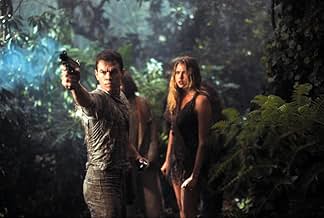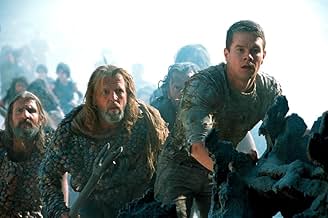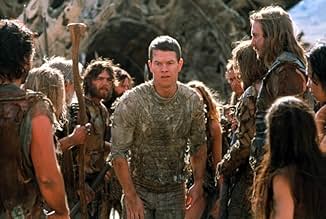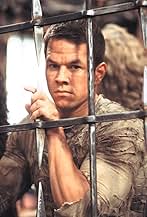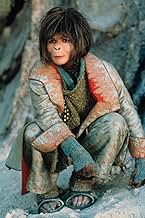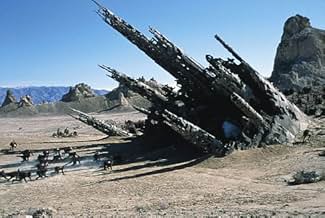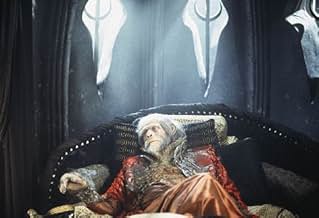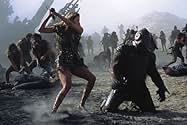In 2029, an Air Force astronaut crash-lands on a mysterious planet where evolved, talking apes dominate a race of primitive humans.In 2029, an Air Force astronaut crash-lands on a mysterious planet where evolved, talking apes dominate a race of primitive humans.In 2029, an Air Force astronaut crash-lands on a mysterious planet where evolved, talking apes dominate a race of primitive humans.
- Nominated for 2 BAFTA Awards
- 11 wins & 32 nominations total
Evan Parke
- Gunnar
- (as Evan Dexter Parke)
Featured reviews
I remember the first time I watched the classic series for the first time, not too long ago. My initial impression: Shock. I had never before witnessed such a captivated tale. The series kept getting better with each movie. Not long after I found out that Tim Burton was to remake "The Planet of the Apes" and I asked myself, "Why bother?" The original series have hardly aged a bit and are still vastly entertaining to watch. Even though the original is over 30 years old, it doesn't feel like it at all. I felt there was no need for a remake. I saw the new film on opening day, and I have to say I was disappointed. The movie wasn't as shocking as the original. It wasn't as captivating. It wasn't anything like the original. The only thing that seemed to save it was the truly shocking twist ending. It really made me think for a while, but, eventually, I gave up. It didn't make sense to me at all. Then, I decided to throw all my initial thoughts of the film away and decided to go see it again for a second opinion, and, this time, I was blown away. Rarely do I see a film and loathe it only to go see it again and absolutley love it. I didn't compare it to the original as I did the first time, and I think that's the reason I completely hated it the first time around. Tim Burton really did an amazing job creating a whole new world of apes where humans are slaves. The cinematography, the set designs, and just about every technical aspect of the film is a marvel, especially the make up and costume designs. Danny Elfman's score is one of his best, and at times, very frightening. The acting is also top notch, from Wahlberg's subtle but heroic portrayal of Leo, to Roth who is absolutely stunning as General Thade. This has got to be the most impressive movie of the summer, if not the year, easily on par with "Hannibal". Just don't go see it and compare it with the original. My grade: A-
After seeing Tim Burton's excellent Sleepy Hollow, and superlative Ed Wood, I was expecting much more of a character driven movie, with the characterization and spiritual philosopies that elevated the original movie out of the pure science fiction genre and into a cerebral adventure film with acutely observed social comments.
Unfortunately, the film suffers from poor script and direction right from the minute the astronaut crashlands.
They knew from the outset that they would never produce an ending to rival the original, and any cinema-goer in their right minds would never expect one. But they could have at least got the beginning right. Neither Mark Wahlberg's character nor the tension is ever developed, so when he is confronted by the apes: we feel nothing.
The humans, though they have the benefit of increased intelligence and speech, are poorly utilized. And Kris Kristofferson is criminally wasted.
The make-up and effects are, as you would expect, fantastic. However, despite improved flexibility in the make-up, there is little warmth in either the performances or direction that made millions of kids go ape-nuts in the seventies. Bonham-Carter's Ari, whilst convincing, is not a patch on Kim Hunter's Zira. Roth's quite brilliant performance as Thade virtually carries this film and makes it the one reason to stick with it to the end.
Did I say end? Well, the less said about that the better.
Unfortunately, the film suffers from poor script and direction right from the minute the astronaut crashlands.
They knew from the outset that they would never produce an ending to rival the original, and any cinema-goer in their right minds would never expect one. But they could have at least got the beginning right. Neither Mark Wahlberg's character nor the tension is ever developed, so when he is confronted by the apes: we feel nothing.
The humans, though they have the benefit of increased intelligence and speech, are poorly utilized. And Kris Kristofferson is criminally wasted.
The make-up and effects are, as you would expect, fantastic. However, despite improved flexibility in the make-up, there is little warmth in either the performances or direction that made millions of kids go ape-nuts in the seventies. Bonham-Carter's Ari, whilst convincing, is not a patch on Kim Hunter's Zira. Roth's quite brilliant performance as Thade virtually carries this film and makes it the one reason to stick with it to the end.
Did I say end? Well, the less said about that the better.
If one wants to remake a movie, the best option is probably to choose and original that was good, but not a great classic. Clearly, any attempt to remake a concept that failed first time around is fraught with danger, but an attempt to remake a classic runs the risk that one's film will be unfavourably compared with the original. The original 1968 film of 'Planet of the Apes' is one of cinema's great science fiction classics. More than an adventure story, it touches on some of the concerns of the late sixties- the fear of nuclear war, race relations- and also raises more fundamental issues about the relationship between man and nature, the relationship between religion and science, Darwinism and animal rights. It was therefore a brave move on Tim Burton's part to try and remake it.
The main concept of Tim Burton's film is basically similar to Franklin Schaffner's. An astronaut from Earth travels to a planet ruled by intelligent apes. Humans exist on this planet, but they are regarded as an inferior species, despised and exploited by the apes. There is, however, an important difference. In the original film, the apes are the only intelligent and articulate beings on the planet. Although they have only attained a pre-industrial level of civilization (they have firearms, but no power-driven machinery, and no means of transport other than the horse or horse-drawn vehicles), they are a far more advanced species than the planet's human inhabitants, who lack the powers of speech and reason and live an animal-like existence. In Burton's remake, humans and apes have similar powers of speech and intellect; it is only the apes' greater physical strength that enables them to dominate the planet and to treat the humans as slaves.
It was this ironic role-reversal, with apes behaving like men and men behaving like beasts, that gave Schaffner's film its satirical power. That film was advertised with the slogan 'Somewhere in the Universe, there must be something better than man!', and the apes are indeed, in some respects, better than man. Their law against killing others of their kind, for example, is much more strictly observed than our commandment that 'Thou shalt do no murder'. There is no sense that the apes are bad and the humans good. Even Dr Zaius, the orang-utan politician, is not a wicked individual; by the standards of his society he is an honourable and decent one. His weakness is that of excessive intellectual conservatism and unwillingness to accept opinions that do not fit in with his preconceived world view. (In this respect the apes are very human indeed).
Burton's film takes a less subtle moral line. It is a straightforward story of a fight for freedom. The villains are most of the apes, especially the fanatical, human-hating General Thade. The heroes are Captain Davidson, the astronaut from Earth, the planet's human population who long for freedom from the domination of the apes, and a few liberal, pro-human apes, especially Ari, the daughter of an ape senator. The apes are more aggressive and more obviously animals than in the original film; they still frequently move on all fours and emit fierce shrieks whenever angry or excited.
There are some things about this film that are good, especially the ape make-up which is, for the most part, more convincing than in the original film and allows the actors more scope to show emotion. (I say 'for the most part' because Ari looks far less simian than do most of the other apes- Tim Burton obviously felt that the audience would be more likely to accept her as a sympathetic character if she looked half-human). The actors playing apes actually seem more convincing than those playing humans. Tim Roth is good as the militaristic Thade, as is Helena Bonham-Carter as Ari. Mark Wahlberg, on the other hand, is not an actor of the same caliber as Charlton Heston, who played the equivalent role in the original film, and Estella Warren has little to do other than look glamorous. (Heston has a cameo role as an ape in Burton's film, and even gets to repeat his famous line 'Damn you all to hell').
Overall, however, the film is a disappointment when compared to the original, a simple science-fiction adventure story as opposed to an intelligent and philosophical look at complex issues. It tried to copy the device of a surprise ending but failed. Schaffner's famous final twist is shocking, but makes perfect sense in the context of what has gone before. Burton's makes no sense whatsoever.
Tim Burton can be a director of great originality, but with 'Planet of the Apes' he fell into the standard Hollywood trap of trying to copy what had already been done and remaking a film that never needed to be remade. It was good to see him return to form with the brilliant 'Big Fish', one of the best films of last year. 6/10
The main concept of Tim Burton's film is basically similar to Franklin Schaffner's. An astronaut from Earth travels to a planet ruled by intelligent apes. Humans exist on this planet, but they are regarded as an inferior species, despised and exploited by the apes. There is, however, an important difference. In the original film, the apes are the only intelligent and articulate beings on the planet. Although they have only attained a pre-industrial level of civilization (they have firearms, but no power-driven machinery, and no means of transport other than the horse or horse-drawn vehicles), they are a far more advanced species than the planet's human inhabitants, who lack the powers of speech and reason and live an animal-like existence. In Burton's remake, humans and apes have similar powers of speech and intellect; it is only the apes' greater physical strength that enables them to dominate the planet and to treat the humans as slaves.
It was this ironic role-reversal, with apes behaving like men and men behaving like beasts, that gave Schaffner's film its satirical power. That film was advertised with the slogan 'Somewhere in the Universe, there must be something better than man!', and the apes are indeed, in some respects, better than man. Their law against killing others of their kind, for example, is much more strictly observed than our commandment that 'Thou shalt do no murder'. There is no sense that the apes are bad and the humans good. Even Dr Zaius, the orang-utan politician, is not a wicked individual; by the standards of his society he is an honourable and decent one. His weakness is that of excessive intellectual conservatism and unwillingness to accept opinions that do not fit in with his preconceived world view. (In this respect the apes are very human indeed).
Burton's film takes a less subtle moral line. It is a straightforward story of a fight for freedom. The villains are most of the apes, especially the fanatical, human-hating General Thade. The heroes are Captain Davidson, the astronaut from Earth, the planet's human population who long for freedom from the domination of the apes, and a few liberal, pro-human apes, especially Ari, the daughter of an ape senator. The apes are more aggressive and more obviously animals than in the original film; they still frequently move on all fours and emit fierce shrieks whenever angry or excited.
There are some things about this film that are good, especially the ape make-up which is, for the most part, more convincing than in the original film and allows the actors more scope to show emotion. (I say 'for the most part' because Ari looks far less simian than do most of the other apes- Tim Burton obviously felt that the audience would be more likely to accept her as a sympathetic character if she looked half-human). The actors playing apes actually seem more convincing than those playing humans. Tim Roth is good as the militaristic Thade, as is Helena Bonham-Carter as Ari. Mark Wahlberg, on the other hand, is not an actor of the same caliber as Charlton Heston, who played the equivalent role in the original film, and Estella Warren has little to do other than look glamorous. (Heston has a cameo role as an ape in Burton's film, and even gets to repeat his famous line 'Damn you all to hell').
Overall, however, the film is a disappointment when compared to the original, a simple science-fiction adventure story as opposed to an intelligent and philosophical look at complex issues. It tried to copy the device of a surprise ending but failed. Schaffner's famous final twist is shocking, but makes perfect sense in the context of what has gone before. Burton's makes no sense whatsoever.
Tim Burton can be a director of great originality, but with 'Planet of the Apes' he fell into the standard Hollywood trap of trying to copy what had already been done and remaking a film that never needed to be remade. It was good to see him return to form with the brilliant 'Big Fish', one of the best films of last year. 6/10
7.5/10
I really appreciate the different approach to the story from Tim Burton's as i really think this Planet Of The Apes remake was pretty good overall, but what lacking the most i think was that because i believe this is a pretty straight forward movie, it happens pretty quickly to the conflict that i felt what lacking the most was the characters development, i do felt in the first half of the movie there is not much of a personality in the characters specifically Tim Roth and Helena Bonham Carter characters, Thade i found quite annoying instead of terrifying in the first half until at the end i can admit that he was basically a mad ape, and Ari was just not as good of a character or sweet of a character as Dr. Zira in the original even if they didn't want to make her like it, but it's not like i hate the characters, they just flawed characters, and i'm finally fine with them towards the end, including the story which i thought again not as clever as the original but i still really enjoyed it and in fact the best thing about the movie, i like the makeup and the costume design, i like Mark Wahlberg in the film, Tim Burton's Planet Of The Apes remake takes on a very different but still interesting take on the story, flawed but still pretty good overall.
Tim Burton's new "Planet of the Apes" is actually a remake--excuse me, a "re-imagining"--of the first TWO movies of the old series. Its occasional paraphrasing of lines from the original movie (devoid of any meaningful context), and its cameos by members of the original cast (Charlton Heston and Linda Harrison), only underscore that this new version isn't what the original was, i.e., an original. Mark Wahlberg, as Our Hero, has none of the cynical, edgy complexity of Heston's Taylor, and is in fact the sort of can-do flyboy Taylor found laughable. Much as I adore Helena Bonham Carter, her turn as Ari, a sultry, sexy, meddling, annoying human-rights activist, is ultimately tiresome, and absolutely incomparable to Kim Hunter's brave, brilliant, impish Zira of the old series. The role is also a criminal waste of Bonham Carter's beauty, hidden as it is behind a bizarre makeup that looks neither ape nor human. Rick Baker's highly-touted ape makeups (which I've enjoyed since the days of "Schlock" and "Kentucky Fried Movie") are highly uneven here. Tim Roth's villainous Thade has the best, with most of the rest being just adequate and no particular improvement over John Chambers' work in the original. And the socko ending (keep reading; I won't spoil it for you) is simply tacked on: unlike the jolting end of the original, it neither ties together nor arises from the movie's earlier action in a way that Explains Everything. Instead, it begs so many questions (mainly "How the heck did THAT happen?") that it seems engineered (or contrived) solely to set the stage for more sequels. All told, this is "Apes Lite," a comic-bookish caricature of the original, made for the short-attention-span crowd. It made me want to do something I hadn't done in ages: fire up the VCR and roll the original again. It's typical of the 1968 movie's gritty, clever irony that the first word of dialogue uttered by an ape--his entire line, in fact--is "Smile."
Did you know
- TriviaMark Wahlberg joined the film after meeting with Tim Burton for only five minutes. He was so anxious to work with Burton that he agreed to play any part. Wahlberg dropped out of the role of Linus in Ocean's Eleven (2001) to do this film.
- GoofsWhen Leo enters the delta pod, he puts on his helmet and it loosely touches the collar of his spacesuit. In the next shots it fits perfectly in the collar.
- Crazy creditsThe background on the 20th Century Fox logo fades to a starfield, before the logo itself fades out and the camera pans to the planet below.
- Alternate versionsThe final kissing scene between Mark Wahlberg and Helena Bonham Carter was edited out in the theatrical run when the movie was first released in India.
- ConnectionsFeatured in Planet of the Apes: Rule the Planet (2001)
- SoundtracksRule The Planet Remix
A Paul Oakenfold Mix
Additional Production by: Paul Oakenfold and Povi
Additional Guitars: Emerson Swinford
Details
- Release date
- Country of origin
- Official site
- Language
- Also known as
- El planeta de los simios
- Filming locations
- Production companies
- See more company credits at IMDbPro
Box office
- Budget
- $100,000,000 (estimated)
- Gross US & Canada
- $180,011,740
- Opening weekend US & Canada
- $68,532,960
- Jul 29, 2001
- Gross worldwide
- $362,211,740
Contribute to this page
Suggest an edit or add missing content





